- Home
- J. A. Konrath
Rusty Nail Page 3
Rusty Nail Read online
Page 3
I could handle it.
I picked out a tape at random and shoved it into my VCR.
Snow. Then an image.
A teenaged girl. Tied to a chair. Crying.
“Hi, Betsy.” Charles Kork’s voice, low and straining to be seductive. “We’re going to play a game. It’s called ‘Please God Make It Stop.’ You see all of these nails? I’m going to hammer them into you, one at a time, and you’re going to beg God for it to stop. Are you ready?”
This happened in the past. I could handle it. I was a police lieutenant.
“Look at how big this nail is, Betsy. I bet it’s really going to hurt.”
I could handle it.
“Here it comes!”
Kork put the nail on the girl’s knee.
I forced myself to watch.
CHAPTER 4
MY FATHER WOULD . . . do things. To himself. To us.”
“What kind of things, Alex?”
Alex shifts on the shrink’s couch, stares at a small water stain on the ceiling. The office is too bright for Alex to get comfortable. It’s like being scrutinized under a microscope.
“Father’s a very religious man. A member of Los Hermanos Penitentes. Are you familiar with the group?”
“Flagellants. They lash themselves to atone for their sins.”
“They’re a Christian sect dating back to the sixteenth century, extremely strict, focusing on redemption through pain. They kneel on tacks. Rub salt and vinegar into their wounds. Mutilate themselves to absolve their sins. They also whip their children. Or make their children whip them.”
“Your father would whip you?”
Alex’s eyes close, memories flooding in. “Among other things.”
“How often did this occur?”
“Sometimes a few times a month. Sometimes every day.”
“And where was your mother during all of this?”
“Dead. When I was just a kid.”
Alex wonders if revealing the next part is wise. But what good is therapy without a little disclosure?
“My mother died of cancer, after I was born. Father took up with different women after that. Bad women. I remember one of them who wasn’t so bad. Father killed her. He beat her to death and buried her in the basement.”
Alex turns to assess Dr. Morton’s reaction. The good doctor remains composed, sitting in his high-back leather chair. Probably fancies himself Sigmund Freud.
“Were the police ever involved?”
“No. Father claimed she ran away, and ordered us never to speak about her.”
Dr. Morton leans forward. “Sometimes, when something traumatic happens to small children, they create events to help them deal with the trauma.”
“You mean maybe I imagined her death, and blamed my father for it? Because he abused me and she was missing?”
Dr. Morton makes a noncommittal gesture.
Alex considers. “That’s interesting. But not true in my case. I watched Father murder her. He tied her to a beam and flayed all of the skin off her body with a cat-o’-nine-tails.”
“And you saw this?”
“Father made me help.”
Dr. Morton jots something down on his notepad.
Alex smiles. “You don’t believe me.”
“I believe this is what you believe, Alex. In our last session, you mentioned your father is still alive.”
Alex thinks of Father. “Yes. He is. If you can call it living.”
“It’s difficult to believe he was never arrested.”
“Isn’t it? I wonder about that sometimes. How different I’d be if someone had stopped him. How many cats would be alive.”
Dr. Morton’s pen stops on the paper. “Cats?”
Alex yawns. It’s been a long week. Not much sleep.
“I kill cats. I get them from animal shelters, and drown them in a bucket of water.”
“Why do you do this, Alex?”
“It makes me feel better.”
“How often?”
“When the need arises. Does that shock you, Doctor?”
Alex meets Dr. Morton’s gaze. The man doesn’t bat an eyelash.
“No. I don’t judge, Alex. I listen, and try to help. When was the last time you killed a cat?”
“A few days ago.”
“Do you think that hurting animals is a way to release some of the pain you endured as a child?”
“Yes. Plus . . .”
“Plus?”
Alex grins. “It’s funny to watch them struggle.”
Dr. Morton stands up, walks to the window, his hands clasped behind his back.
“You’re in control of your own fate, Alex, not a victim to it. At an early age, we all create unique ways to deal with life. With determination and effort, we can change. I don’t think you believe that killing cats is therapeutic, or beneficial, and the pleasure you gain from the act isn’t substantive.” The doctor turns around, raising an eyebrow. “We’ve talked about setting goals before.”
Alex knows where this is headed.
“You think I should quit killing cats?”
“What do you think?”
“Yeah. I could probably do that.”
Dr. Morton nods, playing the mentor role to the hilt.
“How are your other goals? You seem more at ease since last we spoke.”
“I’m getting all of my ducks lined up,” Alex says.
“Any ducks in particular?”
“Tying up loose ends from my past. Working to get over it. Taking small steps, instead of large ones, like you said.”
“Glad to hear it. How about that person you’ve fallen in love with?”
Dr. Morton flips through his notebook, but Alex mentions the name and saves him the trouble.
“Everything is going perfectly. Exactly according to plan.”
“And this love—it’s reciprocated, right?”
Alex wonders about this often.
“That’s an interesting question, Doctor. Can you ever truly know if love is being returned? You wear a wedding ring, so I assume you’re married, and I assume you love your wife. But even if she says she loves you, you can’t crawl around in her head and feel it for yourself. You can’t ever truly know.”
“I feel loved, and that’s reassurance enough. Do you feel loved, Alex?”
Alex thinks, really thinks hard.
“Sometimes. Sometimes I do.”
A gentle beeping sound comes from Dr. Morton’s desk. The doctor walks over and presses a button on the alarm, silencing it.
“That’s our time today, Alex. See you tomorrow.”
Alex stands up, stretches. “Absolutely. This is really helping me a lot. I appreciate you fitting me in.”
“That’s good to hear. And remember your goal.”
“Don’t kill any cats. Got it.”
They shake hands, and Dr. Morton shows Alex to the door.
Outside the office, Alex smiles big. Leaving cats alone for a week will not be a problem. Not at all.
The next thing Alex plans on killing isn’t a cat.
CHAPTER 5
I DIDN’T SLEEP.
Slumber and I were old adversaries, and on an average night I spent six hours doing the toss and turn, with only one or two hours of actual REM.
But last night I had trouble even closing my eyes.
I managed to get through the Kork tape, right up to the sad, sickening end. I kept the sound on, so I heard all the begging, all the screams. All the laughing and grunting.
Cops tended to be more cynical than the average citizen, but I tried to err on the side of neutrality when it came to human nature. I’d seen good, and I’d seen evil, and mankind exhibited both.
Watching the tape changed that for me. I showered, slapped on some makeup, dressed quickly in generic flats, some black Kenneth Cole pants, and a beige turtleneck sweater from the Gap, and drove to work with absolute tunnel vision. There were no depths to human cruelty. The knowledge burned in my stomach like a hot coal.<
br />
We were told to be careful of the us against them mentality, but when I finally got to my office, fighting rush hour traffic, watching the honking and the swearing as humans cut each other off, I truly hated my fellow man. I tried to bury my feelings in work. After a cup of vending machine coffee that tasted slightly worse than it smelled, I began going through reports.
The CSU had lifted several dozen prints from the Kork house, which were being run through the database. No prints on the toe jar, or the note. The video that had been dropped off was a Sony brand, available everywhere. The envelope manufacturer still wasn’t known, but it looked like an average padded mailer, and was probably sold at thousands of stores.
The desk sergeant had used an Identikit to put together a composite of the man who dropped off the video. He was average height, thin, in his thirties, with a full blond beard. He wore reflective sunglasses, a Cubs baseball cap, and a hooded sweatshirt. The picture had an eerie similarity to the much-circulated artist’s sketch of the Unabomber.
No prints on the tape. Prints from Herb and the desk sergeant were lifted from the envelope, along with a white powder residue that smelled like cleanser, such as Ajax or Comet. It was an old burglar trick. Scrubbing your hands with detergent will temporarily strip your hands of their natural oils, making it impossible to leave prints.
I called 411, looking for a last known address of Diane Kork, the Gingerbread Man’s ex-wife. Couldn’t hurt to question her again, if someone had picked up where her husband had left off. I found her in Bucktown, unlisted. I gave the operator my badge number and a minute later he called me back with her address and phone number.
I called, got a machine, and left a message. Then I called the county morgue.
“Hughes.”
“Morning, Max. Jack Daniels.”
“Hi, Jack. Here’s what I got so far. Sixty-eight toes, from nine different bodies. They’ve been preserved, and I’m guessing they might be anywhere from twenty to fifty years old.”
Max was an assistant medical examiner, and he considered small talk a mark of unprofessionalism.
“Preserved?”
“Packed in salt. There are still some grains left. The skin is completely dehydrated, no biological activity present.”
“Is that why some of them are so small? They shrunk?”
“There’s been some shrinkage, yes, but many of the toes are tiny because they came from children.”
My mind catapulted me back to the video.
Hughes went on. “I’ve got a forensic anthropologist friend named Coran who’s taking a look at the X-rays—she’ll be more specific. I’m a soft tissue guy, not a bone guy.”
“Could they have come from corpses?”
“You thinking a grave robber?”
“Or an undertaker who keeps souvenirs.”
“Possibly. But several of the toes have slices along the toenails, and along the underside.”
“Hesitation marks?”
“They’re more consistent with defense marks. If someone were trying to cut off your toes, you’d struggle. Wouldn’t be easy to do, even to a child. I don’t think I can test for histamine in a dried specimen, but I’d bet my house they were removed while these people were still alive.”
Pleasant thought. I concentrated on the age. If the toes were twenty years old, they could have come from some of Kork’s early victims. But anything older would have been impossible.
“One more strange thing, Jack—each of the toes has a tiny hole running through them, through the bones.”
“Any idea what that means?”
“None.”
“Thanks, Max. Call me when you know more.”
I hit the computer, searching for missing persons reports going back to 1950.
The number was in the millions.
I added restrictions to my search, confining it to the Midwest, sticking to the years 1970-1996.
Millions became tens of thousands. Still too many to conceivably go through. I back-burnered the idea for later and spun through my Rolodex, looking for an old number at the UIC.
“You’ve reached the office of graphologist Dr. Francis Mulrooney. Please leave a message at the beep.”
“Dr. Mulrooney, this is Lieutenant Jack Daniels of the—”
A click. “Lieutenant Daniels? How delightful to hear from you! I apologize for not picking up. I’ve been forced to screen my calls lately due to some unpleasantness. How can I be of service?”
“Do you still have those handwriting samples from the Gingerbread Man case?”
“Of course.”
“I’ve got another note. It looks similar, but I’m not the expert. Any chance of you coming by sometime this week?”
“I’ve got some things coming up at the university. Let me check my schedule.”
I could picture him, reaching a delicately manicured hand into his tailored vest pocket for his appointment book. Mulrooney was short, thin, with a slight blond mustache, comically thick glasses, and a fetish for bow ties. Academics normally intimidated me, but this one I liked. He was both helpful and unpretentious, two traits most professors lacked.
“I’m free tomorrow, late afternoon. But if you’d like a fast and dirty opinion, you can fax it to me.”
“If you wouldn’t mind.”
Mulrooney read off his fax number. I had a photocopy of the recent Evanston note, and managed to feed that into my fax machine on my third try.
“It’s coming through now. Will you pardon me for a moment, Lieutenant?”
“Take your time.”
I trimmed my thumbnail with my teeth, imagining the petite man going over the writing sample with a magnifying glass.
“Very interesting. Very interesting indeed. Is the original in marker?”
“Yes.”
“Clever.”
“It’s clever to write in marker?”
“One of the things graphologists look at is pressure. Felt-tip pens disguise that. Tell me, the fax you sent, is this the original size, or did you enlarge it?”
“The real sample is half the size.”
“I see. I look forward to seeing the actual note. This is a very interesting sample. We don’t see this too often.”
“See what, Doctor?”
“It appears to be a forgery. Someone who has seen Kork’s original handwriting and has done their best to imitate it. The descending t-bars. The slant. The capitalization. But there are some obvious differences. First of all, Kork’s writing is heaviest in the lower zone. This person is an upper zone writer, an indicator of high intelligence. Also, there are some feminine characteristics at work here.”
I blinked. “A woman wrote this?”
“It’s impossible to determine sex from a handwriting sample, and men can have feminine qualities in their script, just as women can have masculine qualities.”
Mulrooney went into a lecture about the differences between male and female traits in handwriting, but my attention was drawn away by a very unpleasant surprise standing in my doorway.
“Dr. Mulrooney?” I interrupted. “Something just came up. I look forward to seeing you tomorrow.”
“Hmm? Oh, yes, of course. Until then, Lieutenant.”
I replaced the receiver on the cradle and turned to face my demons.
CHAPTER 6
HELLO AGAIN, LIEUTENANT. I hope you remember us. I’m Special Agent Dailey, this is Special Agent Coursey.” He leaned forward a fraction. “From the Bureau.”
They had matching crew cuts. Special Agent Jim Coursey wore a gray suit. Special Agent George Dailey, the same height and build as Coursey, also sported a gray suit, but his buttons were squarish compared to Coursey’s roundish buttons. That must be how their handler could tell them apart.
“Can I see some ID?” I asked.
Dailey reached for his pocket, but Coursey stopped him with a look.
“She’s kidding. She does that.”
“Didn’t you read my profile?” I asked Dailey.
&n
bsp; He dropped his hand back to his side and concentrated on looking Federal. Dailey and Coursey were ViCAT operatives from the FBI’s Behavioral Science Unit. ViCAT stood for Violent Criminal Apprehension Team, which used high-tech suspect profiling techniques and state-of-the-art crime detecting computers to waste the time of local cops like me.
“We have some exciting news,” said Coursey.
I couldn’t pass that up. “You’re quitting the Bureau and joining the traveling cast of Riverdance?”
“No. The Evanston Police Department has invited us in on the new Gingerbread Man murder.”
Here was proof that God hated me.
“We’ve obtained a copy of the video. It contains some similarities to the previous Kork murders.”
“Gentlemen,” I began, “while it makes me feel all warm and fuzzy inside that you’re—”
“We’ve had Vicky do a profile.” Coursey talked over me while Dailey removed a thick packet of paper from his briefcase and plunked it on my desk.
“Vicky is what we call the ViCAT computer,” Dailey added. “She’s a comprehensive compiled database of criminal activity committed throughout the United States.”
Every time they dropped by, they explained Vicky to me. Perhaps I had a sign around my neck that said: “Tell me again, I’m an idiot.”
“Though we haven’t had enough time to fully analyze the videotape of the murder, Vicky postulates that this is the work of a copycat,” said Coursey.
“A copycat,” said Dailey.
“A copycat,” said I. “Was your first clue the note, or the fact that it took place in the same house as Kork’s murders?”
Sarcasm was wasted on these guys, but that didn’t stop me from making an effort.
“If you’ll look over the profile, you’ll notice that this crime took an extraordinary amount of planning and organization,” said Coursey.
“So much so, that Vicky doesn’t believe this is the work of a single individual,” said Dailey.
“The facts point to the perpetrator being a group of individuals,” said Coursey.
“A group?” said I.
“An organized group of at least three people. Perhaps members of a club or organization.”

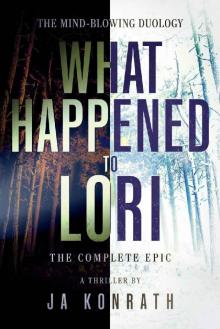 What Happened to Lori
What Happened to Lori Shot Girl
Shot Girl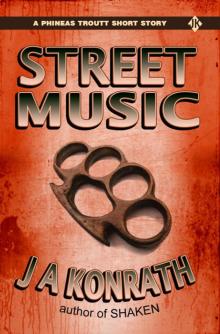 Street Music
Street Music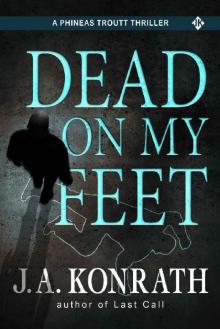 Dead on My Feet
Dead on My Feet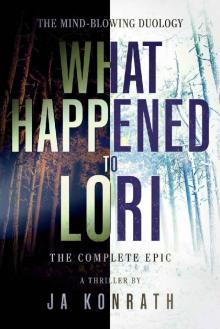 What Happened To Lori - The Complete Epic (The Konrath Dark Thriller Collective Book 9)
What Happened To Lori - The Complete Epic (The Konrath Dark Thriller Collective Book 9)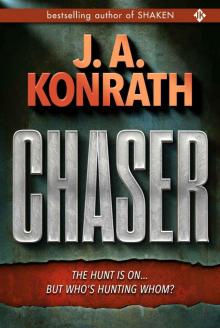 Chaser
Chaser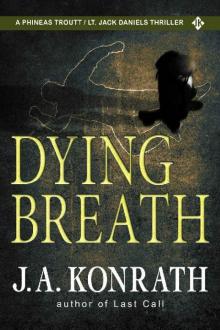 Dying Breath - A Thriller (Phineas Troutt Mysteries Book 2)
Dying Breath - A Thriller (Phineas Troutt Mysteries Book 2) Jack Daniels Six Pack
Jack Daniels Six Pack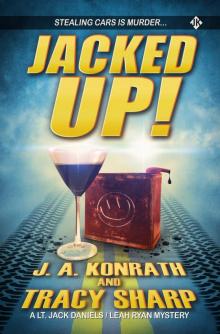 Jacked Up! (A Lt. Jack Daniels/Leah Ryan Mystery)
Jacked Up! (A Lt. Jack Daniels/Leah Ryan Mystery)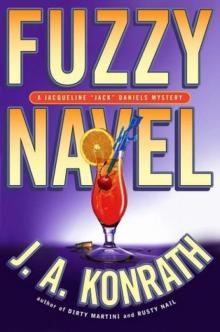 Fuzzy Navel
Fuzzy Navel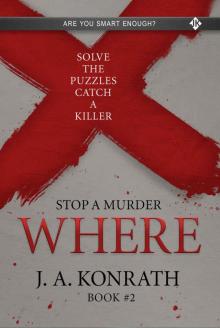 STOP A MURDER - WHERE (Mystery Puzzle Book 2)
STOP A MURDER - WHERE (Mystery Puzzle Book 2)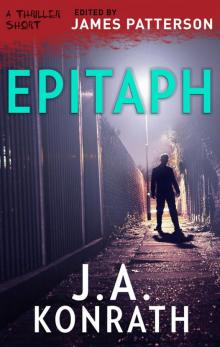 Epitaph
Epitaph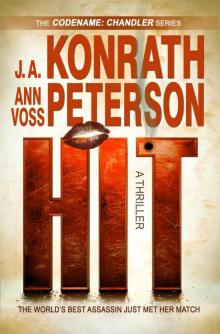 Hit: A Thriller (The Codename: Chandler)
Hit: A Thriller (The Codename: Chandler)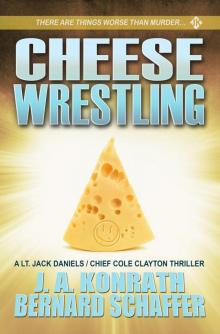 Cheese Wrestling: A Lt. Jack Daniels/Chief Cole Clayton Thriller
Cheese Wrestling: A Lt. Jack Daniels/Chief Cole Clayton Thriller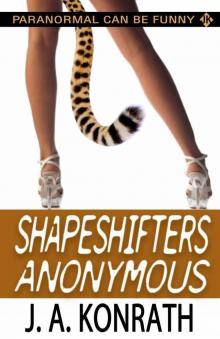 Shapeshifters Anonymous
Shapeshifters Anonymous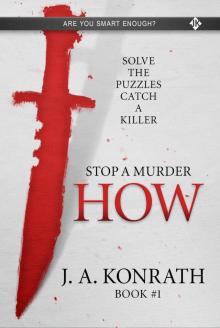 STOP A MURDER - HOW (Mystery Puzzle Book 1)
STOP A MURDER - HOW (Mystery Puzzle Book 1) Bloody Mary
Bloody Mary Dying Breath
Dying Breath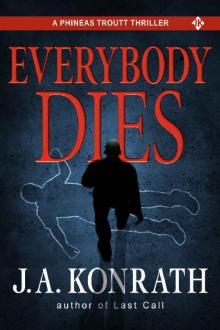 Everybody Dies - A Thriller (Phineas Troutt Mysteries Book 3)
Everybody Dies - A Thriller (Phineas Troutt Mysteries Book 3) DRACULAS (A Novel of Terror)
DRACULAS (A Novel of Terror) Shot of Tequila
Shot of Tequila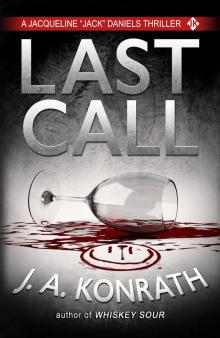 Last Call - A Thriller (Jacqueline Jack Daniels Mysteries Book 10)
Last Call - A Thriller (Jacqueline Jack Daniels Mysteries Book 10)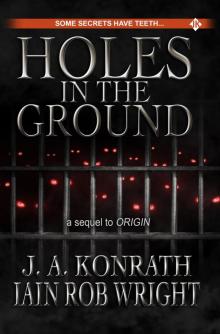 Holes in the Ground
Holes in the Ground![Shaken [JD 07] Read online](http://i1.bookreadfree.com/i1/04/01/shaken_jd_07_preview.jpg) Shaken [JD 07]
Shaken [JD 07]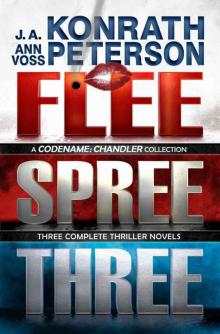 Flee, Spree, Three (Codename: Chandler Trilogy - Three Complete Novels)
Flee, Spree, Three (Codename: Chandler Trilogy - Three Complete Novels)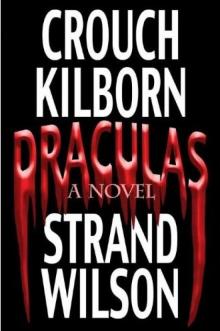 Draculas
Draculas Jack Daniels Stories
Jack Daniels Stories Wild Night is Calling
Wild Night is Calling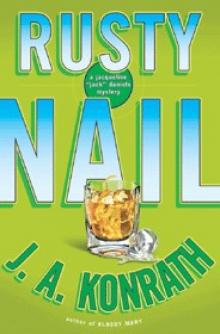 Rusty Nail
Rusty Nail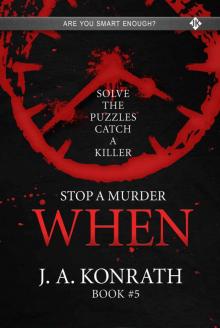 STOP A MURDER - WHEN (Mystery Puzzle Book 5)
STOP A MURDER - WHEN (Mystery Puzzle Book 5)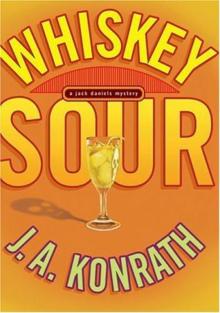 Whiskey Sour
Whiskey Sour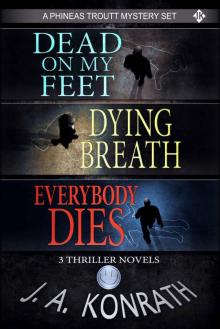 Phineas Troutt Series - Three Thriller Novels (Dead On My Feet #1, Dying Breath #2, Everybody Dies #3)
Phineas Troutt Series - Three Thriller Novels (Dead On My Feet #1, Dying Breath #2, Everybody Dies #3)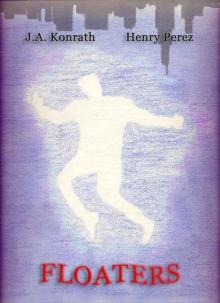 Floaters - A Jack Daniels/Alex Chapa Mystery
Floaters - A Jack Daniels/Alex Chapa Mystery J.A. Konrath / Jack Kilborn Trilogy - Three Scary Thriller Novels (Origin, The List, Haunted House)
J.A. Konrath / Jack Kilborn Trilogy - Three Scary Thriller Novels (Origin, The List, Haunted House)![Shaken (Jacqueline Jack Daniels Mysteries) [Plus Bonus Content] Read online](http://i1.bookreadfree.com/i2/04/10/shaken_jacqueline_jack_daniels_mysteries_plus_bonus_content_preview.jpg) Shaken (Jacqueline Jack Daniels Mysteries) [Plus Bonus Content]
Shaken (Jacqueline Jack Daniels Mysteries) [Plus Bonus Content]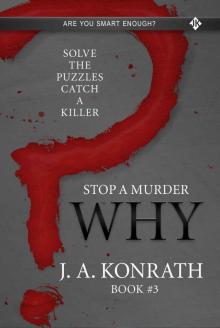 STOP A MURDER - WHY (Mystery Puzzle Book 3)
STOP A MURDER - WHY (Mystery Puzzle Book 3)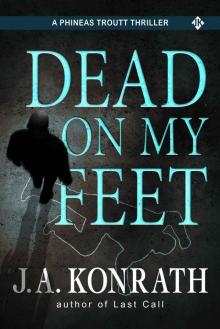 Dead On My Feet - A Thriller (Phineas Troutt Mysteries Book 1)
Dead On My Feet - A Thriller (Phineas Troutt Mysteries Book 1) Cherry Bomb
Cherry Bomb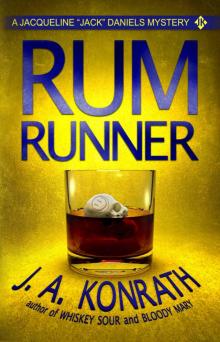 Rum Runner - A Thriller (Jacqueline Jack Daniels Mysteries Book 9)
Rum Runner - A Thriller (Jacqueline Jack Daniels Mysteries Book 9)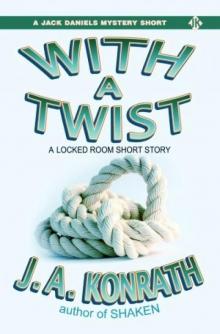 With a Twist
With a Twist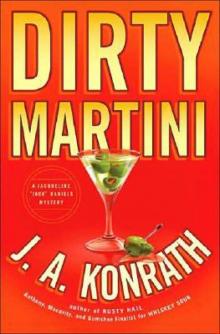 Dirty Martini
Dirty Martini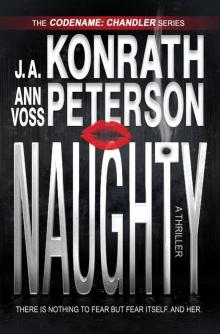 Naughty
Naughty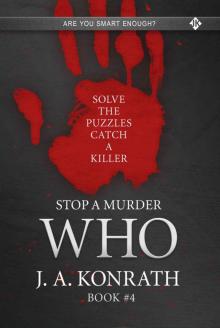 STOP A MURDER - WHO (Mystery Puzzle Book 4)
STOP A MURDER - WHO (Mystery Puzzle Book 4)